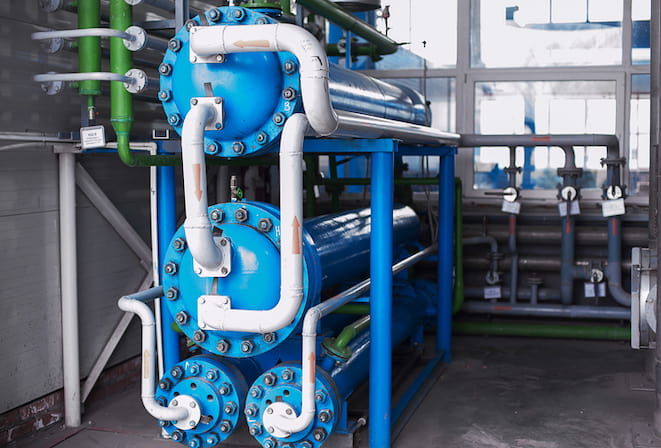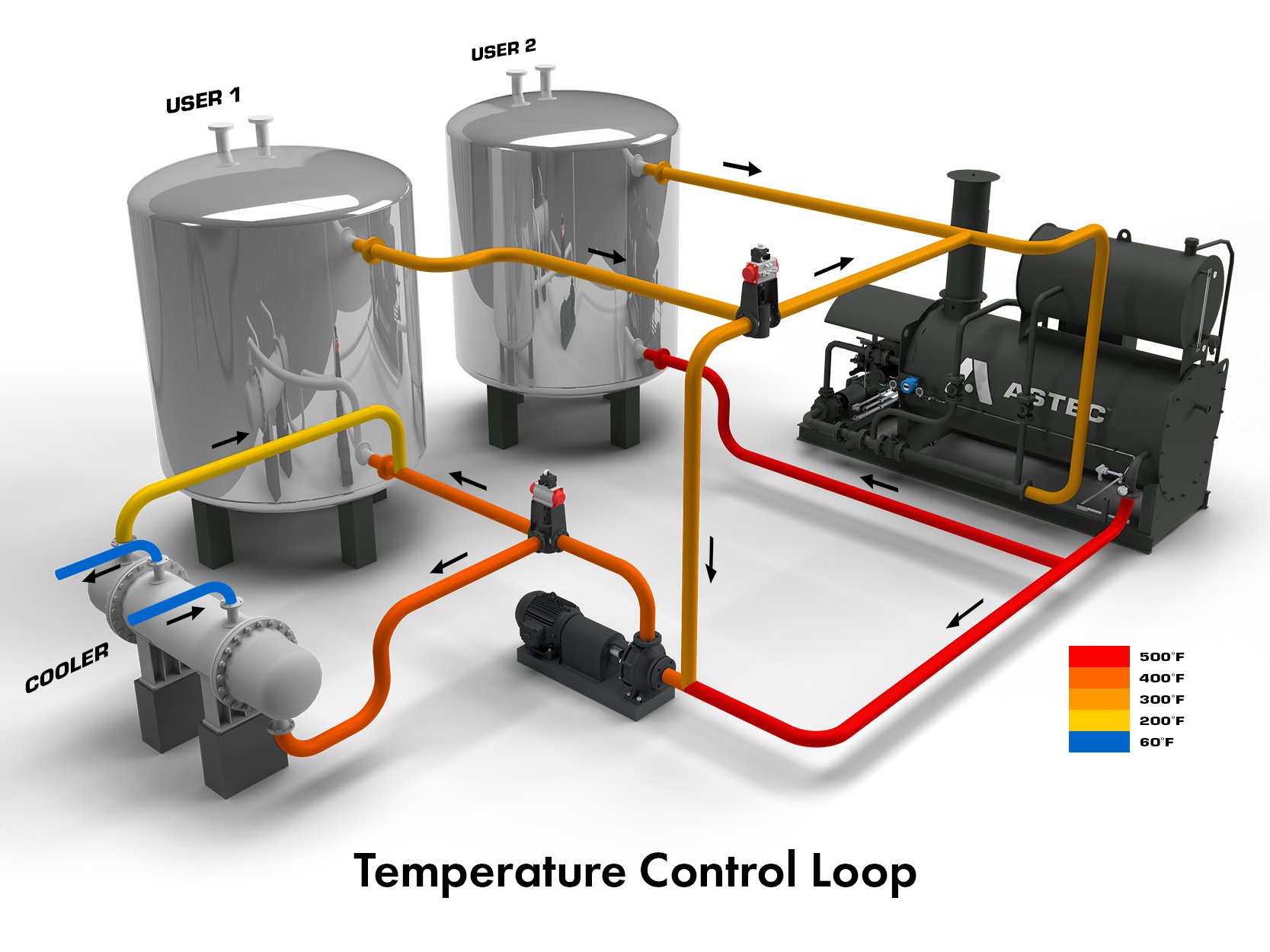How DVS Heat Transfer Systems Support Lifecycle Sustainability from Design to Disposal
Wiki Article
The Duty of Heat Transfer Solutions in Sustainable Energy Solutions for the Future
Heat transfer systems are important in the quest for lasting power services. They enhance thermal power administration, boosting the performance of sustainable modern technologies. By using systems like conduction, radiation, and convection, these systems decrease power losses. Their function in solar thermal and geothermal applications is especially significant. As technologies arise, the capacity for further advancements raises vital questions concerning future power methods. What advancements will shape the landscape of sustainable energy?Recognizing Heat Transfer Equipments

The Significance of Thermal Energy Administration
Reliable thermal power monitoring is vital for optimizing energy efficiency and decreasing waste in various systems. By controling temperature level and optimizing Heat transfer procedures, companies can substantially decrease power intake and operational expenses. Reliable management involves the application of advanced technologies and techniques that keep track of and manage thermal problems within systems, making certain that energy resources are used successfully. In enhancement, correct thermal power administration adds to reducing greenhouse gas emissions, aligning with worldwide sustainability objectives. It also enhances system dependability and performance, resulting in improved product high quality and longer devices life expectancy. Inevitably, prioritizing thermal power management is a vital step towards creating extra lasting power services and fostering a liable strategy to energy intake in commercial and property contexts.Applications of Heat Transfer in Renewable Resource
While various eco-friendly power resources assure sustainability, the reliable application of Heat transfer plays a crucial duty in their performance. In wind energy systems, Heat transfer is used for turbine component cooling, enhancing efficiency and long life. Geothermal power counts on efficient Heat exchange in between the earth's subsurface and the liquid flowing in the system, maximizing power removal. Biomass energy processes also take advantage of Heat transfer, as it aids in transforming organic products right into useful fuel via pyrolysis and gasification. Furthermore, in hydropower, maintaining excellent temperature levels in reservoirs can boost energy result. Each of these applications demonstrates the vital significance of Heat transfer systems in boosting sustainable power innovations, eventually adding to a much more lasting energy future.Enhancing Solar Thermal Power Efficiency
As solar thermal power systems continue to develop, improving their efficiency has actually become crucial for making the most of power output. Breakthroughs in Heat transfer technologies, such as improved thermal storage space products and cutting-edge Heat exchangers, play a considerable role in boosting performance. By using sophisticated materials that have exceptional thermal conductivity, systems can record and transfer Heat more efficiently. In addition, integrating radar that follow the sunlight's course guarantees that collectors get ideal solar direct exposure throughout the day. Making use of nanotechnology in solar absorbers can additionally raise power absorption rates. Additionally, integrating automated control systems assists manage temperature levels and take care of power distribution effectively, leading to reduced losses and boosted general system performance. These enhancements lead the way for more sustainable solar thermal energy solutions in the future.Geothermal Home Heating: A Sustainable Service
Geothermal heating presents a practical alternative for sustainable energy, providing substantial environmental benefits through reduced greenhouse gas discharges. Its efficiency and cost-effectiveness make it an appealing alternative to traditional heater. Challenges associated to implementation needs to be addressed to optimize its potential influence.Environmental Advantages of Geothermal
Typical heating techniques contribute significantly to greenhouse gas discharges, geothermal home heating provides a compelling option that decreases environmental effect. By harnessing the Earth's internal Heat, geothermal systems make use of a renewable energy source, significantly reducing dependence on nonrenewable fuel sources. This approach creates minimal carbon exhausts, making it a cleaner option for business and household heating. Furthermore, geothermal systems promote energy efficiency, as they require less energy compared to standard heater. DVS Heat Transfer Systems. The application of geothermal power likewise aids in decreasing air contamination, boosting local air top quality and public wellness. As a sustainable service, geothermal heating supports climate adjustment reduction efforts, placing itself as a crucial part in the shift in the direction of a greener futurePerformance and Cost-Effectiveness
Exactly how does geothermal home heating gauge up in regards to performance and cost-effectiveness contrasted to standard heating unit? Geothermal heating demonstrates premium effectiveness, often achieving a coefficient of efficiency (POLICE OFFICER) of 3 to 5, indicating it generates three to 5 units of Heat for every single system of electricity taken in. This performance equates into lower operating expense, specifically in areas with secure geothermal resources. Initial installment costs can be more than traditional systems; nevertheless, lasting cost savings on energy costs and reduced upkeep costs can counter these upfront financial investments. Additionally, many governments incentivize geothermal systems through discounts and tax obligation credits, enhancing their cost-effectiveness. In general, geothermal home heating becomes a sustainable and financially sensible alternative to even this website more standard heating remedies.Execution Challenges and Solutions
Numerous difficulties can impede the extensive implementation of geothermal furnace, in spite of their clear advantages as a sustainable energy option. High preliminary setup costs usually hinder home owners and view capitalists, making funding a considerable obstacle. Additionally, the geographical restrictions of ideal geothermal websites limit access in specific areas. Local guidelines and allowing procedures can also complicate project advancement, causing hold-ups. Moreover, public awareness and understanding of geothermal systems stay reduced, hindering approval. To attend to these obstacles, targeted education projects can boost public knowledge, while government incentives might ease monetary concerns. Working together with regional authorities to enhance laws may facilitate smoother project approvals, inevitably promoting the fostering of geothermal home heating as a sensible, lasting power alternative.Developments in Heat Transfer Technologies
Advancements in Heat transfer innovations play an important role in enhancing power effectiveness and sustainability. Advanced Heat exchangers and phase change materials go to the center of these developments, using considerable enhancements in thermal management. These technologies not just maximize energy usage but additionally add to decreasing environmental effect in various applications.Advanced Heat Exchangers
Advanced Heat exchangers play a crucial role in boosting power effectiveness throughout different applications in lasting power options. These gadgets facilitate the transfer of Heat between 2 or even more fluids, substantially decreasing energy usage in processes such as commercial heating, air conditioning, and power generation. Technologies in materials and layout, such as using nanofluids and compact setups, have actually caused enhanced thermal efficiency and decreased dimension requirements. In addition, developments in digital surveillance and control systems enable maximized operation, more increasing effectiveness. By lessening waste Heat and making the most of power recovery, advanced Heat exchangers add to lower carbon impacts and sustain the shift toward eco-friendly technologies. Their continued advancement is vital for accomplishing international energy sustainability goals.
Stage Adjustment Products
The integration of stage change materials (PCMs) right into Heat transfer innovations stands for a significant improvement in energy monitoring and efficiency. PCMs take in and release thermal energy during their phase modifications, making it possible for effective temperature guideline in structure products and power systems. By storing excess Heat throughout height durations and launching it when need boosts, PCMs add to load moving and energy conservation - DVS Heat Transfer Systems. This ability enhances the performance of renewable resource systems, specifically in solar thermal applications. In addition, PCMs can boost the thermal convenience of interior atmospheres, reducing reliance on conventional heating and cooling down approaches. As innovations in PCM formulas proceed to arise, their role in lasting power remedies is poised to grow, offering promising opportunities for future research and application
Future Potential Customers for Heat Transfer in Sustainable Energy
As the demand for sustainable energy services proceeds to climb, the like it duty of Heat transfer systems is becoming progressively important fit future technologies. Advancements in products and layouts are anticipated to boost effectiveness in Heat transfer, reducing power losses in different applications. The assimilation of advanced thermal storage space systems, such as stage modification materials and thermochemical storage, will allow much better monitoring of power sources. Study right into nanofluids and biomimetic Heat exchangers might better maximize thermal efficiency. Furthermore, the adoption of clever modern technologies will permit real-time tracking and adaptive control of Heat transfer processes. These advancements are positioned to considerably add to the overall performance and sustainability of power systems, leading the way for a much more energy-efficient future.Often Asked Questions
How Can People Implement Heat Transfer Equipment in the house?

People can execute Heat transfer systems in the house by setting up energy-efficient home appliances, utilizing radiant heat, and enhancing insulation. These measures boost power performance, minimize costs, and advertise lasting practices in residential settings.

What Are the Costs Connected With Setting Up Heat Transfer Equipments?
The expenses related to setting up Heat transfer systems differ extensively, generally encompassing equipment, installation labor, and maintenance. Elements such as system kind, home size, and local laws greatly influence the total expense entailed.Exist Government Rewards for Heat Transfer System Installations?
Government motivations for Heat transfer system setups vary by region and can consist of tax obligation grants, refunds, and credit scores. These monetary benefits intend to motivate adoption, inevitably advertising power effectiveness and minimizing environmental effect within neighborhoods.How Do Heat Transfer Systems Effect Power Costs?
Heat transfer systems notably influence power bills by enhancing energy effectiveness. By improving the transfer of Heat, these systems decrease energy intake, causing lower energy costs and producing a more sustainable approach to power management.What Maintenance Is Needed for Heat Transfer Equipments?
Upkeep for Heat transfer systems includes regular evaluations, cleaning of parts, checking liquid levels, making sure correct insulation, and replacing used components. These jobs help preserve performance, avoid breakdowns, and extend the system's functional lifespan.These systems help with the motion of thermal power from one medium to another, enabling the transfer of Heat for home heating, air conditioning, or energy generation purposes. Geothermal energy depends on reliable Heat exchange between the earth's subsurface and the fluid distributing in the system, optimizing power removal. In addition, geothermal systems promote energy effectiveness, as they need less energy contrasted to conventional home heating systems. Advanced Heat exchangers play a crucial duty in boosting power effectiveness across various applications in lasting energy remedies. Heat transfer systems significantly influence energy expenses by enhancing energy efficiency.
Report this wiki page